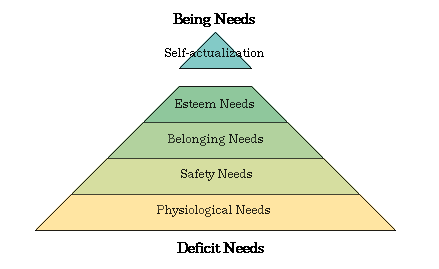It's good to have a nice life. A life that reflects our ideals, beliefs, and desires. Some people get to witness this higher plain of life so to speak. This higher plain, for the most part, must be worked for in order to achieve it. I know that someday I want to have a professional career but what exactly motivates me to want this? I want to live my life the way I want it while reaching success. Currently I am working towards it and I focus on what I have to do now in order to reach it. I still am lacking in certain areas that I know I must improve upon before I will feel accomplished. My needs are relative to my current situation, or in other words, only what I need now. As I age and reach further success or failure my needs will change depending on the outcome. For instance if I completely fail and end up on the streets I will need a place to stay and money to eat, things that I have now. What governs these needs and can they be placed in any sensible order?
In 1954 a man named Abraham Maslow tried to understand what motivates us through life. Maslow's theory states that we have to satisfy our needs in a certain order. He dubbed it the hierarchy of our needs.

Maslow established our needs based on two categories; deficiency needs and growth needs. These deficiency needs must be met before one can reach the growth stage and they must be met in order. If we ever lose any of these needs they will come to attention and we will focus on fixing them first regardless of how high we have made it up his hierarchy.
Maslow believed that our most basic underlying needs include our bodily comforts, hunger, and thirst. Our body needs these things in order to function properly or in another sense to move on in life. Once we have achieved these basic needs to survive, our next goal will be to reach security and safety. I believe this means putting a roof over our heads and to make sure that we are not constantly at danger. This need is important to reaching a calm state of mind to move onto the more complex needs.
The next goal we encounter up his hierarchy is our need for a sense of belonging or love. This deals with social relationships and is important for most of us to have relationships in our lives. Whether it’s through a team, family, dating, or group affiliation we all need to feel as if we are accepted for whom we are. The next step we come to is our esteem. I can see why we need to have social relationships first in order to improve upon our self-esteem. We need that support in order to feel better about ourselves which improves us and sends us to the next category, our growth needs.
The growth category begins with the cognitive stage or in simpler terms our need to understand things outside of our basic existence. It is at this point we reach self-actualization and where we begin to better ourselves in different aspects. With the esteem and security in our lives we can invest attention on improving our knowledge. At this point we have a thirst for information. Once we are constantly learning and exploring reaching understanding we may have never thought we would in the past we will want to improve on our aesthetic needs. We will want to have order in our lives and improvement with our physique and what we have in our environment. This is where we do most of our advancement in life. We better ourselves until we are satisfied with our lives. Most people would be happy just to get to this stage but the next stage is reserved for this that reach ultimate fulfillment.
The final stage we reach is our desire to edify others. We seek to give others that same satisfaction we have achieved through life. Whatever assistance we can give we try to give back in order to make our lives more fulfilling.
Through life we always have needs and desires. What we can accomplish is directly related to our will. Maslow offers a great theory for placing all these needs and dreams we have, in order from chaos. Since he established this theory, even with little evidence, it has been widely accepted. I know that I am not at the final stage and I have obstacles and work to overcome before I reach this final place. Success can be measured in many different ways but personally we all have a final goal we wish to reach.
Link